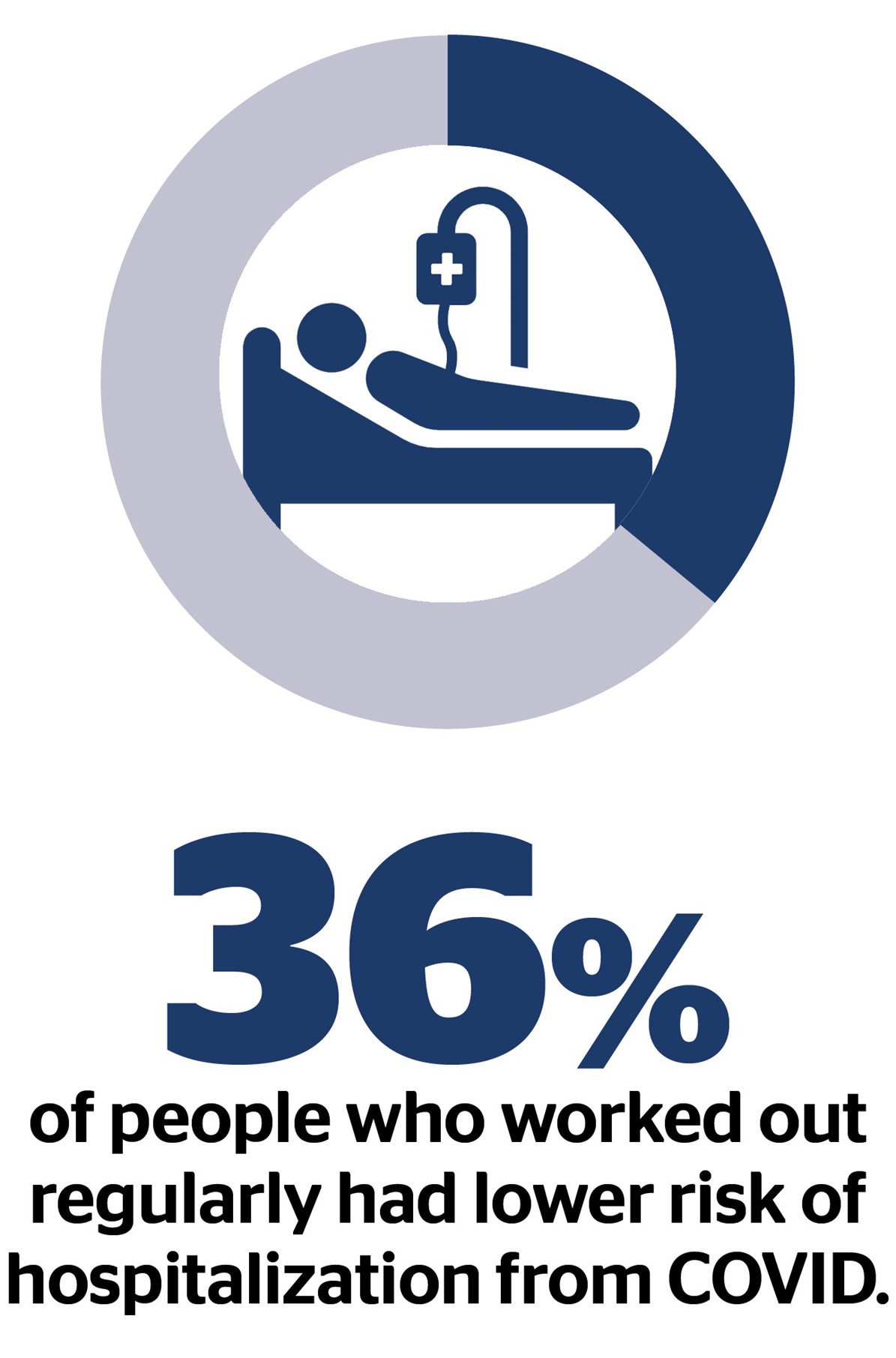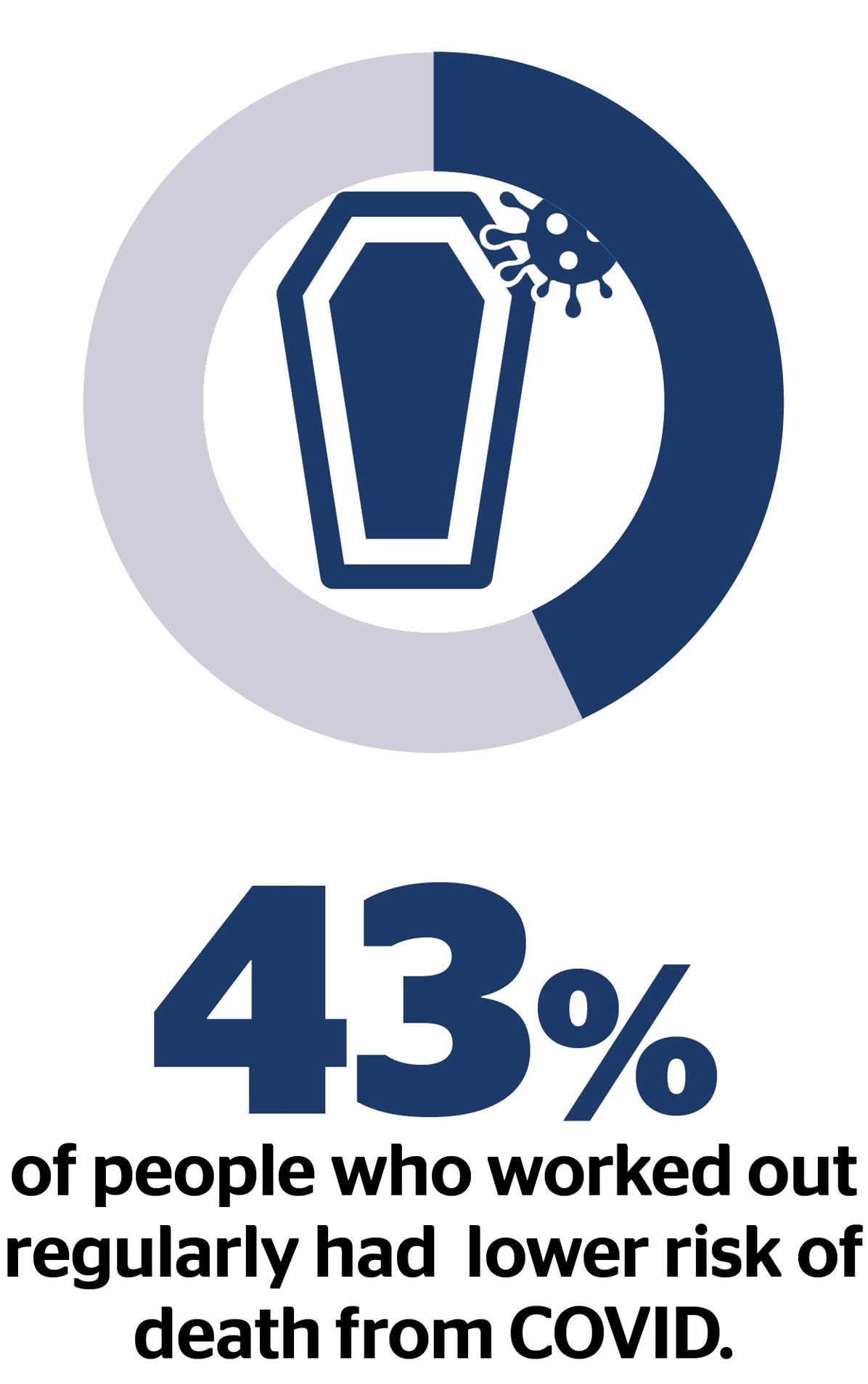You have probably heard the advice: One of
the best things you can do to keep healthy — especially as cold and flu season
creeps up — is stay physically active.
اضافة اعلان
This folk wisdom has been around for ages, but until
recently, researchers did not have much data to support the idea. Now,
scientists studying risk factors related to
COVID-19 have turned up some
preliminary evidence about the link between regular exercise and better immune defenses
against disease.
When researchers reviewed 16 studies of people who
stayed physically active during the pandemic, they found that working out was
associated with a lower risk of infection as well as a lower likelihood of
severe COVID. The analysis, published last month in The
British Journal of Sports Medicine, has generated a lot of enthusiasm among exercise scientists,
who say the findings could lead to updated guidelines for physical activity and
health care policy that revolves around exercise as medicine.
Experts who study immunology and infectious disease
are more cautious in their interpretation of the results. But they agree that
exercise can help protect health through several different mechanisms.
Exercise
could bolster immunity in a variety of ways
For decades, scientists have
observed that people who are fit and
physically active seem to have lower rates of several respiratory tract
infections. And when people who work out do get sick, they tend to have less
severe disease, said David Nieman, a professor of health and exercise science
at
Appalachian State University, who was not involved in the recent COVID
review.
“The risk of
severe outcomes and mortality from the common cold, influenza, pneumonia —
they’re all knocked down quite a bit,” Nieman said. “I call it the vaccine-like
effect.”

The new
meta-analysis, which looked at studies between November 2019 and March 2022,
found that this effect extends to COVID. People from across the globe who
worked out regularly had a 36 percent lower risk of hospitalization and a 43
percent lower risk of death from COVID compared with those who were not active.
They also had a lower likelihood of getting COVID at all.
People who
followed guidelines recommending at least 150 minutes of moderate activity or 75
minutes of vigorous activity per week seemed to get the most benefit. But even
those who exercised less than that were more protected against illness than
those who did not work out at all.
Researchers
theorize that exercise may help fight off infectious bacteria and viruses by
increasing the circulation of immune cells in your blood, for example. In some
small studies, researchers have also found that the contraction and movement of
muscles releases signaling proteins known as cytokines, which help direct
immune cells to find and fight off infection.
Even if your
levels of cytokines and immune cells taper off two or three hours after you
stop exercising, Nieman said, your immune system becomes more responsive and
able to catch pathogens faster over time if you work out every day. “Your
immune system is primed, and it is in better fighting shape to cope with a
viral load at any given time,” he said.
In healthy
humans, physical activity has also been linked to lower chronic inflammation.
Widespread inflammation can be extremely damaging, even turning your own immune
cells against your body. It is a known risk factor for COVID, Nieman said.
Therefore, it makes sense that reducing inflammation could improve your chances
of fighting off infection, he said.
Research also
shows that exercise may amplify the benefits of some vaccines. People who
worked out right after getting their COVID-19 vaccine, for example, seemed to
produce more antibodies. And in studies of older adults who were vaccinated
early during flu season, those who exercised had antibodies that lasted
throughout the winter.
Exercise provides a
slew of broader health benefits that may help reduce the incidence and severity
of disease, said Dr Stuart Ray, an infectious diseases specialist at
Johns Hopkins University School of Medicine. Building a walk, jog, gym trip, or sport of
choice into your routine is known to help reduce obesity, diabetes and heart
disease, for example, all of which are risk factors for severe influenza and
COVID. Working out can help you get more restful sleep, boost your mood and
improve your insulin metabolism and cardiovascular health, improving your
chances against the flu and COVID. It is hard to know, Ray said, whether the
benefits come from direct changes to the immune system or just overall better
health.
The
research can only tell us
so much
Dr Peter Chin-Hong, an
infectious disease specialist at the University of California, San Francisco,
agreed that more research was needed before scientists could pinpoint a
specific mechanism or causal link. In the meantime, he said, it’s important not
to put too much faith in it.

“For now, you can’t say, ‘I’ll go to the gym so that
I can prevent getting COVID,’” Chin-Hong said. The problem with studying the
precise effect of physical activity on immunity is that exercise is not
something that scientists can easily measure on a linear scale, Ray said.
“People exercise in many different ways.”
Study participants typically self-report the amount
and intensity of their exercise, which can often be inaccurate. And just
expecting exercise to be beneficial can provide a powerful placebo effect. As a
result, it can be hard for researchers to tell exactly how much exercise or
what type is ideal for immune function. It’s also quite possible that people
who work out regularly may share other attributes that help them fight off
infections, such as a varied diet or better access to medical care, Ray said.
Beyond that, “there is a huge debate about whether
or not too much exercise makes you more susceptible to infection and illness,”
said Richard Simpson, who studies exercise physiology and immunology at the
University of Arizona.
Marathon runners often report getting sick after
races, Simpson said, and some researchers think that too much vigorous exercise
could inadvertently overstimulate cytokines and inflammation in the body.
Exercising without a break also depletes the body’s glycogen stores, which for
some people could lead to impaired immune function for a few hours or a few
days, depending on their baseline health, he said. And working out in group
settings or attending intense sports training camps could be exposing athletes
to more pathogens. Other experts point out that people who are physically
active might simply keep closer track of their health.
Still, for the average exerciser, early evidence suggests
there may be a protective effect against getting severely ill. But those who
have trouble getting enough exercise or can’t exercise at all for some reason
shouldn’t despair, Ray said. “What helps one person stay healthy compared to
another is a complex mix of factors,” he said.
Read more Health
Jordan News



